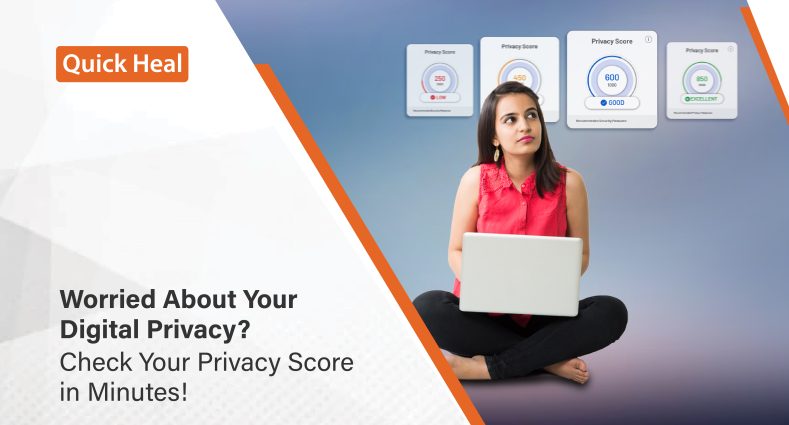Worried About Your Digital Privacy? Check Your Privacy Score in Minutes!

Have you been hearing the term “digital privacy” a lot lately? If you’re not aware of the concept, you must educate yourself about it ASAP!
Today, the need to be aware of the privacy of your data and your life on the internet is extremely important. Having internet security is like a guard who keeps your financial data, browsing history, and personal messages secure from scammers.
But, how can you tell if you are digitally safe or your crucial data is actually private?
This is where privacy score comes in. It’s a score that tells you how well you keep your financial data, personal messages, and browsing history intact. Want to understand how you can calculate your digital privacy score? Here is everything you need to know.
The Reality of Digital Privacy Threats
Every day when you navigate the internet, you leave some form of digital footprint behind. It is a trace of records of all your internet activities that lead to your identification. However, while you enjoy the perks of this, be aware of common threats to your digital privacy.
- Data breaches: Hackers get access to your online information through fraudulent means and use it for malicious purposes.
- Online tracking: This refers to the practice of monitoring and collecting user data without consent, often for targeted advertising or other purposes. This data can include financial data, personal messages, and browsing history.
- Phishing attacks: These attacks mislead individuals into revealing sensitive information such as credit card numbers and financial information. Scammers pretend to be trustworthy entities through email or text messages to get confidential information. It poses serious privacy risks as it can lead to identity theft, financial fraud, and unauthorized access.
- Malware: Malicious software such as ransomware and trojans compromise the security of your devices. Malware steals sensitive information, disrupts operations, or even renders systems unusable.
- Social Engineering: Attackers attempt to manipulate accountants into revealing sensitive information or performing actions that compromise security. Social engineering techniques can include pretexting, impersonation, or manipulation through social media.
Stop Hackers in Their Tracks: Check Your Privacy Score Today!
Have you ever heard of privacy scores? They give you a way to measure and understand how secure your data is. So, if you’re wondering how well your information is protected online, a privacy score can give you a good idea.
Privacy scores look at a bunch of stuff to come up with their rating, like how strong the encryption is on the sites you use, how transparent they are about collecting your data, and how good their measures are for keeping it safe. Below is a step-by-step guide that will help you test your privacy score and what it means for you.
- You will have to choose an appropriate tool that can check your digital privacy. In this regard, Quick Heal’s Privacy Score is the best.
- Once you have selected the tool, submit the required details for assessment purposes. This could include information about device security settings, applications, or data-sharing routines.
- You’ll get a privacy score after the assessment on ‘Privacy Score’. To interpret your privacy score, you’ll need to look at the detailed report provided by the tool.
The report can help break down what each part of the score means and point out areas where you could do better.
The privacy score is a key indicator of the security of personal online information. Quick Heal v24 is an all-inclusive solution that has a Privacy Score feature that acts as a shield against cyber-attacks such as ransomware, spyware, and phishing.
Here are some more features you can get with Quick Heal’s Total Security:
- Data breach alert allows for proactive steps against common information breaches. It updates the user on issues such as email IDs and passwords getting compromised.
- Anti-Tracker allows blocking websites from monitoring online activities.
- Password protection features are at the forefront by limiting entry to antivirus settings changes.
- Safe Wi-Fi feature establishes the authenticity of networks; securing your devices from hacking
How to Improve Your Privacy Score
Improving your digital privacy is a continuous process. Below are some tips that you can use to enhance your privacy:
- Use complicated passwords and think about using a password manager to help you keep track of them.
- Your files and communications need to be encrypted for them to remain safe and not get into the wrong hands.
- Activate two-factor authentication to add more security layers to your accounts.
- Keep checking your privacy settings and adjust them as needed.
- Keep software programs up-to-date to defend against the latest security breaches.
Conclude Your Privacy Journey with Quick Heal’s Privacy Score
If you don’t want cyber threats to harm you, regularly check your privacy practices. Quick Heal’s commitment to privacy is unwavering, and it can become your perfect partner to ensure maximum digital privacy and security for yourself and your family.
So, are you ready to safeguard your digital world? Experience the power of Quick Heal Total Security today! Click here to safeguard your devices and enjoy worry-free browsing.
No Comments, Be The First!